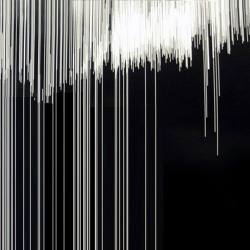Albums
The Flaming Lips with Neon Indian - The Flaming Lips with Neon Indian
by Adam King
June 2, 2011
The Flaming Lips with Neon Indian - The Flaming Lips with Neon Indian
by Adam King
June 2, 2011
|
|
|
|
 |
||
|
|
|
If you're unfamiliar with the warped‚ electo-delia that Neon Indian has been molding for the past few years‚ then let me assure you that there couldn't be a more natural collaboration for him to try than the Flaming Lips. Sharing a common thread in embracing left-field psychedelics despite coming from conservative home-bases (Texas and Oklahoma respectively)‚ Neon Indian's digi-wobble serves as an ideal template for The Lips' massive art-rock expansion.
Right from the start individual familiarities are blurred and lost‚ and the hybrid beast that remains demands an eerie embrace. "Is David Bowie Dying" sounds just like its title -- a distant death march for Major Tom -- like you're watching your Ziggy Stardust vinyl spin into the void of space. A steady beat akin to the breathing of an iron bullfrog is flavored throughout with the seeming cries of a tortured robot while Wayne Coyne's voice echoes desperately in the distance like he's having a bad mescaline trip in the corner of an unfinished basement. It's a heavy cut in more ways than one‚ as you can't help but feel oddly warmed by the audible fear in Coyne while he recites lines like "Take your eyes and leave/one for love and one for me" and "Take your legs and run into the death rays of the sun."
"Alan's Theremin" is 8 minutes of digitized ambience‚ with different stages of emotive modal development -- kinda like if Brian Eno made an album called Ambient 12: Music for a Rusty Spaceship. But in contrast‚ the subsequent synthesizer bashing on "You Don't Respond" sounds absurdly obnoxious. Essentially the most obtrusive busy-signal ever‚ pumped through several rounds of distortion‚ it's like beating your head with a bat for 3 minutes so the final 18 seconds of chimes and vocals will feel all that much better.
Things do loosen up quite a bit more on the final track‚ "Do You Want New Wave or Do You Want the Truth Part 2." Nothing more than snippets of an undeveloped jam‚ it's the same groove you and you buddies play when someone's got a new keyboard but everybody's out of weed. Basically it's what you'd expect to hear coming out the back door of the Fillmore West on a Sunday afternoon in 1967‚ and a taste of the full range of experimentation this mashup was willing to try. The record leaves off with a touch less promise than from where it began‚ but still enough that this shouldn't be the last we hear from this collective.
related articles
Shows: The Flaming Lips + The Black Keys
Albums: The Flaming Lips - The Terror
Shows: The Flaming Lips at Osheaga
Blog: Osheaga 2011 Preview
Albums: The Flaming Lips - Gummy Song Skull
More on: The Flaming Lips, Neon Indian
Shows: The Flaming Lips + The Black Keys
Albums: The Flaming Lips - The Terror
Shows: The Flaming Lips at Osheaga
Blog: Osheaga 2011 Preview
Albums: The Flaming Lips - Gummy Song Skull
More on: The Flaming Lips, Neon Indian
new to state of mind
Shows: moe.
Shows: Yonder Mountain String Band
Shows: Grand Point North 2014
Shows: Catskill Chill 2014
Shows: moe.down 15
Shows: Gov't Mule
Shows: Umphrey's McGee
Shows: Newport Folk Festival 2014
Shows: Widespread Panic
Albums: Phish - Fuego
Shows: moe.
Shows: Yonder Mountain String Band
Shows: Grand Point North 2014
Shows: Catskill Chill 2014
Shows: moe.down 15
Shows: Gov't Mule
Shows: Umphrey's McGee
Shows: Newport Folk Festival 2014
Shows: Widespread Panic
Albums: Phish - Fuego
random awesomeness
Blog: Song of the Day: Brad Mehldau Trio - "Knives Out"
Blog: Don't Be a Dick‚ Go to a Benefit Show
Shows: Jeff Tweedy
Blog: Ice T Says: "Respect Your Elders, Nigga"
Albums: Talking Heads - The Name of this Band is Talking Heads
Albums: Fool's Gold - Leave No Trace
Shows: Soulive
Shows: Lotus
Blog: Bill Frisell Plays John Lennon
Albums: Carrigan - Young Men Never Die
Blog: Song of the Day: Brad Mehldau Trio - "Knives Out"
Blog: Don't Be a Dick‚ Go to a Benefit Show
Shows: Jeff Tweedy
Blog: Ice T Says: "Respect Your Elders, Nigga"
Albums: Talking Heads - The Name of this Band is Talking Heads
Albums: Fool's Gold - Leave No Trace
Shows: Soulive
Shows: Lotus
Blog: Bill Frisell Plays John Lennon
Albums: Carrigan - Young Men Never Die
